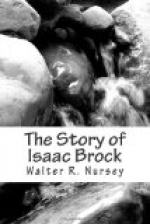“My object,” said Brock, addressing the Indians, “is to assist you to drive the ‘Long-knives’ [Americans] from the frontier, and repel invasion of the King’s country.” Tecumseh, speaking for his tribesmen, remarked, not without sarcasm, that “their great father, King George, having awakened out of a long sleep, they were now ready to shed their last drop of blood in that father’s service.”
“The pale faces,” he continued, after an impressive pause—and the fire of his eloquence and his gestures swayed his hearers like the reeds on the river bank—“the Americans who want to fight the British are our enemies.... They came to us hungry and they cut off the hands of our brothers who gave them corn.... We gave them rivers of fish and they poisoned our fountains.... We gave them forest-clad mountains and valleys full of game, and in return what did they give our warriors and our women? Rum and trinkets and—a grave!... The shades of our fathers slaughtered on the banks of the Tippecanoe can find no rest.... Their eyes can see no herds on the hills of light in the hunting grounds of the dead!... Until our enemies are no more we must be as one man, under one chief, whose name is—Death!... I have spoken.”
Tecumseh, it should be known, bore a personal grudge against the Americans, especially against the 4th Regiment, then in garrison at Detroit, the “heroes of Tippecanoe.” This was a terrible misnomer, for under General Harrison, with 1,000 soldiers, less than a year before, they had taken part in the slaughter of Tecumseh’s half-armed band of 600 men and women on the banks of the Tippecanoe River, during that chief’s absence with many of his warriors, and had laid waste his village. With a perhaps pardonable spirit of vindictiveness, such as is shared by both redskin and white man, the human-being in him thirsted for revenge.
Brock, perceiving Tecumseh’s sagacity and influence over the savages, invited the Shawanese and Wawanosh, Ojebekun and the other sachems, to a private council. Here he unfolded his plans. Before doing this he made it a condition that no barbarities were to be committed. “The scalping-knife,” said he, “must be discarded, and forbearance, compassion and clemency shown to the vanquished.” He told them he wanted to restrict their military operations to the known rules of war, as far as was possible under the singular conditions in which they fought, and exacted a promise from the lofty-minded Tecumseh that his warriors “should not taste pernicious liquor until they had humbled the Big-knives.” “If this resolution,” remarked Brock, “is persevered in, you must surely conquer.”
Brock’s rapid ascendency over the Indians was astonishing; they already revered him as a common father.




